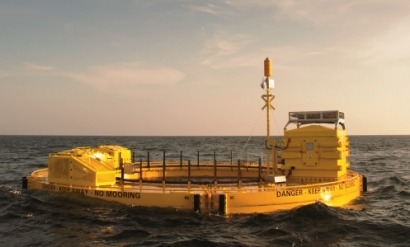
Cornwall has cemented a growing international reputation for leadership in marine energy research and development, with the Fred Olsen installation a real success story for the industry. The device was manufactured at A&P Falmouth, one of the UK’s leading shipyards, will be tested at FabTest, part of the South West Marine Energy Park, and potentially deployed in more energetic offshore waters at the grid connected Wave Hub site off the Cornish coast near Hayle.
FabTest consists of a pre-consented two square kilometre area of sea between two and three kilometres offshore in Falmouth Bay offering a range of depth and seabed types in three berths. It will enable wave energy generation device developers to conduct sea trials of their devices and components in moderate seas with excellent access to nearby port infrastructure. FabTest’s pre-consented status aims to maximise deployment efficiencies and minimise costs to applicants and complements the grid-connected facilities at Wave Hub 10 nautical miles off the north coast of Cornwall.
"Through the extensive marine experiences of Fred. Olsen related companies we have learned the considerable value that detailed, careful sea testing of new marine devices offers projects such as BOLT “Lifesaver”,” comments Tore Gulli, Project Director, of Fred. Olsen Ltd. “We very much welcome the initiative from Falmouth Harbour Commission, University of Exeter and the other partners to make the FabTest a reality. We are proud to be the first user of the facility seeing our wave energy converter deployed successfully."
The unique FabTest site, which is not connected to the grid, gives developers the chance to test devices in a near shore environment that is easily accessible. Tests include investigating structural integrity, response behaviour, mooring/umbilical behaviour, subsea components, monitoring systems and deployment procedures in moderate sea conditions.
FabTest was created as a partnership project between Falmouth Harbour Commissioners (FHC), Wave Hub, the University of Exeter, A&P Group, Cornwall Marine Network and Mojo Maritime, all of whom provide advice, expertise and support to the industry. The integrated test site is around a mile south of St Anthony Head and can also test floating wind energy devices.
FHC and The Crown Estate have signed a lease to create FabTest, and the site has been issued with a license by the Marine Management Organisation (MMO), which allows the mooring of marine energy converter devices. The management of the site will be undertaken by a partnership between FHC and the University of Exeter.
David Ellis, Chairman of Falmouth Harbour Commissioners, says: “The deployment of the BOLT “Lifesaver” device is an historic moment, not only for Falmouth but for the entire marine renewable sector in the South West.
“We set up FabTest in response to demand from industry and are proud to have been instrumental in getting this ground-breaking project up and running. It is the only example of which we are aware of a harbour authority taking out a Crown Estate lease for the purposes of testing marine energy devices – it is very unusual.
In January, the South West was named as the UK’s first Marine Energy Park, creating a collaborative partnership between commercial and academic organisations, with the aim of speed up the progress of marine power development. Wave and tidal energy has the potential to generate up to 27GW of power in the UK alone by 2050, equivalent to the power generated from 8 coal-fired power stations.
A study commissioned by the South West RDA (Regional Development Agency) and published in 2010 calculated there are sufficient marine energy resources for commercial use within 50 km of the South West coast to deliver 9.2 gigawatts of electricity, equivalent to the annual needs of 20% of UK households, or 5% of the UK’s electricity needs by 2030.
“We believe the South West is realising its objective to become a leading region in marine renewable energy and are perfectly positioned to support the development and growth of the sector,” says Paul Weston, Marine Renewable Projects Manager, of A&P Falmouth.
For additional information:

